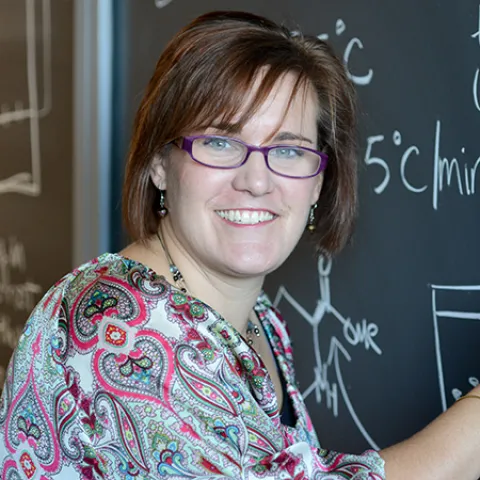
Amy Deveau gets students “charged up” about Chemistry
As an undergraduate student in biology class, when it came time for the fetal pig dissection, Amy Deveau thought she would throw up. “Actually, I think maybe I did throw up,” she remembered. Realizing that dissections, with all their blood and gore, were not for her, Deveau, who had always excelled in the sciences, reaffirmed her belief that the study of chemistry was the right path for her to take.
At Stonehill College, Deveau, originally from East Millinocket, Maine, majored in chemistry and secondary education. She aspired to be a high school chemistry teacher. It seemed like a great fit for someone with a passion for chemistry who also loved working with students. She eventually realized, though, how much she enjoyed research and concluded that teaching undergraduates at the college level would give her the best of both worlds—the ability to conduct her own research and the opportunity to instill in young people a love of chemistry.
So after earning her Ph.D. from the University of Virginia and completing post-doctoral training at the University of Vermont, Deveau jumped at the chance to apply for a position at UNE—a university that also satisfied her need to be in a setting not drastically different from the one in which she grew up. “I never was a big city girl,” she explained, while sitting cozily in her office on a rainy September morning.
“UNE has been a great fit for me,” she said. “It’s small, but it’s not too small, and there is so much potential for innovation and growth. It has a real dynamic nature.” Deveau also noted that as a chemistry professor, she appreciates the University’s relationship with the health sciences, perhaps because one of her areas of interest lies in the crossroads of chemistry and biology: medicinal chemistry. She is especially interested in the biochemistry of the opioid system and has conducted cutting-edge research, as she successfully built molecules capable of reversing an overdose of a certain class of drugs, allowing for detoxification without withdrawal symptoms, and easing side effects in people who are required to take the medications on a long-term basis.
Despite her success in the laboratory, Deveau says that she would never want to move toward a career without the teaching component. “I wouldn’t want to run a massive lab and pump out publications,” she explained. “I want to foster independence and understanding in undergrads and get them to be the best scientists they can be.”
Warm and out-going, Deveau has many qualities that would be stifled by exclusive lab work. “I could never just be in a lab all day, every day,” she said, “without people to talk to.” With a genuine commitment to being the best instructor possible, even Deveau’s research interests include studies of how to ensure that her students get the most out of their chemistry class. “Having a background in education, I am always thinking about how I can be a better teacher and develop more interesting materials for my students,” she said. Deveau is particularly interested in learning-style differences and how to present materials in ways that optimize students’ comprehension.
Of course, teaching and researching are not mutually exclusive. One of Deveau’s goals is to engage her students in research. “I want to put them in a role where they can contribute intellectually to the work,” she explained. “And that’s very time-consuming, but very, very rewarding.”
It’s no wonder that Deveau’s greatest honor in her career has nothing to do with her impressive accomplishments in the lab, but rather that she was asked to hood a former student (ceremoniously placing a hood over a new graduate’s head) upon her completion of medical school at UNE’s College of Osteopathic Medicine.
“That meant so much to me,” she said. “It was such a special moment.”
One need not spend a great deal of time with Deveau discussing chemistry before noticing her natural inclination to break down difficult concepts and explain things in terms understandable to her audience. “Let me find you a good picture,” she said as she scanned her computer files to find just the right document to illustrate what she had been explaining. With her extensive knowledge and her eagerness to share it, it’s easy to see that she has the brain of a chemist and the heart of a teacher.
When it comes to her passions, no dissection is needed.